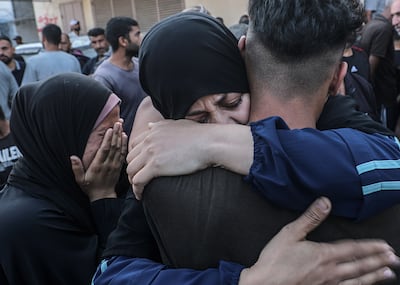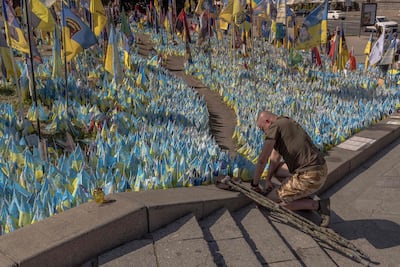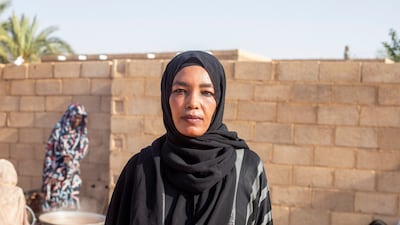When Salah Al Din (known as Saladin in the West) was battling European Crusaders in Palestine, he suspended hostilities when his enemies sickened from dysentery. He sent his physicians, and his orchard’s juiciest plums to comfort his arch-opponent, King Richard of England.
The 12th-century warrior campaigned in Gaza, Golan, Aleppo, Beirut, Jerusalem, Damascus and Bekaa. What would he think of the present-day conflict in many of these places?
Salah Al Din also committed atrocities but learnt to minimise civilian harm and treat prisoners decently after realising that conciliation – not revenge – better achieved his aims.
The notion of forgiveness is lost from our modern rules-based order, which is centred around righting wrongs through prosecution and punishment. And so, retaliations dominate international relations, whether through aggression, punitive economic sanctions or the instrumentalisation of the UN and international courts.
Inevitably, the Palestine-Israel conflict or the civil war in Sudan are endlessly iterated as layers of hurt and injury that keep passions bubbling and no one gives way.
Salah Al Din showed extraordinary statesmanship to rise above this. He was inspired by his Islamic faith and the traditions of his region, a tumultuous mix of Arab, Kurdish, Turkish and Persian cultures.
He was not unique. Over millennia, all faiths and cultures have developed rules for limiting wars. Evolutionary psychologists explain why. Our species is hard-wired for violence, as glorified in countless sagas. So, saving humanity requires curbing war’s extremes. First, because mercy for opponents begets equal consideration for ourselves. Second, fighting without egregious cruelties helps eventual reconciliation and peace.
This is customary international humanitarian law (IHL) and it combines a duality of selfish and selfless considerations. Its modern codification generated the First Geneva Convention of 1864, which reached its current form in 1949. Its lead drafter, Jean Pictet of the International Committee of Red Cross, observed astutely that its wide acceptance came from “keep[ing] it realistic" as "nothing is more dangerous than unbridled humanitarianism”.
Further Geneva Conventions followed: Second, Third and Fourth, also in 1949, their Protocols I and II in 1977 and Protocol III in 2005. All countries are party to the Conventions, which apply to both international and non-international armed conflicts.
In summary, they protect people not participating in hostilities and impose limits on the means and methods of warfare. Their principles are clear but practical interpretation has always been contentious, and never more so than now.
Normalised across today's record war-making are numerous anti-humanitarian behaviours: destroying livelihoods, water supplies and health care, or displacing, blockading and starving people while denying aid and attacking relief workers. Sexual violence, hostage taking, prisoner abuse and sundry other cruelties are not uncommon.
Why don’t the Geneva Conventions protect against such horrors?
To start, the Conventions stagnate while militaries evolve. The initial Geneva Convention reacted to first-generation warfare – the 1859 Battle of Solferino – and then limped to catch up with second-generation (First World War) and third-generation (Second World War) warfare.
The atomic bombing of Hiroshima and Nagasaki cruelly exposed their limitations and necessitated other conventions prohibiting nuclear, chemical and biological weapons as well as proscribing landmines and certain explosive armaments.
The Geneva Conventions were further challenged by proliferating fourth-generation warfare during the Cold War by the asymmetrical tactics of non-state actors, including anti-colonial insurgents.
Meanwhile, electronics, artificial intelligence, robots including drones, and materials and energy sciences have progressed apace. Innovations in data management, intelligence and surveillance compound the lethality of today’s hybrid or fifth-generation warfare.
We see the impacts most fiercely in Gaza and Ukraine because of another great shift: in the places we fight over. With most people living in crowded urban areas where strategic assets such as leaders and critical production facilities such as factories and power stations are located, fighters and civilians function cheek by jowl. So, war gets waged from – and retaliation visited upon – high-rise apartments and their underground bunkers and tunnels.
This causes justified outrage when innocents are caught in the crossfire. That women and children bear the brunt is not unexpected; they constitute 70 per cent of any war-affected population.
IHL demands a military-civilian distinction to be made, and so lawyers often sit alongside operational commanders to advise on targetting. The accuracy of modern weapon systems has also improved. But their deployment is still subject to the emotions and scruples of belligerents. These are the first to go in intense conflict, and war crimes occur through acts of omission and commission.
Meanwhile, war’s social context has also changed. Today’s warriors are not only totting guns in uniform. They sit in jeans directing drones or spreading hate and misinformation from remote laptops. Or they may manage criminal financial enterprises to benefit war-making projects. As the keyboard is now as mighty as the sword, does that turn conflict enablers behind the frontlines into legitimate targets?
This is a grey zone for the Geneva Conventions but an increasingly acute question as wars degenerate into whole-of-society undertakings.
Besides, the Geneva rules only apply in armed conflicts. But situations of no-war-no-peace are common, such as in Syria or Afghanistan. Most abuses are committed in contexts of chronic instability with lawyers arguing whether humanitarian or human rights law applies.
Meanwhile, the Conventions only enjoin combatants to do their best to protect civilians, but specify no formula for acceptable collateral damage. Neither do they direct that humanitarian dimensions override military imperatives.
So, for example, over 70 per cent of Gaza has been pulverised after one year of war, and 10 per cent of its people killed, injured or gone missing. Do the different proportions signify care by Israeli attackers to minimise casualties or, conversely a genocidal extermination strategy?
Thus, based on perspective, civilian casualties are either explained away or angrily condemned. For example, Hamas in Gaza and Hezbollah in Beirut are accused of using civilian shields in urban strongholds from where they fire rockets at Israel. Conversely, furious Israeli retaliation is seen as terrorising civilians en masse. Israel’s weaponisation of Hezbollah pagers could either be smartly targetting opponents directly or could constitute a war crime because of associated civilian damage.
Meanwhile, where do the Geneva Conventions stand on those providing weaponry and related lethal assistance to various theatres of combat? They are ambivalent on the application of the Conventions’ provisions to the sponsors of wars.
Such contradictions are rooted within the Geneva Conventions because their underlying ethos tolerates war while striving to make it humane. However, the reality is that wars are always hellish. The absurdity of humanising that is obvious. As our television screens testify, there are few clean ways to fight.
Reacting to criticism, considerable effort is going into fine-tuning the Geneva Conventions to the changing patterns of war. But that risks making their rules yet more complex, which paradoxically could license more sophisticated forms of brutality. It also risks making humanitarian relief more difficult, driving belligerents farther apart, and possibly lengthening and widening wars.
That would be a perverse legacy of the Geneva Conventions marking their 75th anniversary. Not to be stranded in the cul de sac of mounting inhumanities requires rising beyond narrow, legalistic provisions to an earlier era. Fortunately, we have a rich worldwide patrimony of customary IHL. A stocktake by the ICRC revealed at least 160 traditional customs that helped to control earlier wars.
A way forward is to encourage fighters to find inspiration beyond the Geneva Conventions by digging deeper into their own cultural decencies. A lesson from Salah Al Din, eight centuries ago.
Jetour T1 specs
Engine: 2-litre turbocharged
Power: 254hp
Torque: 390Nm
Price: From Dh126,000
Available: Now
BMW M5 specs
Engine: 4.4-litre twin-turbo V-8 petrol enging with additional electric motor
Power: 727hp
Torque: 1,000Nm
Transmission: 8-speed auto
Fuel consumption: 10.6L/100km
On sale: Now
Price: From Dh650,000
Red flags
- Promises of high, fixed or 'guaranteed' returns.
- Unregulated structured products or complex investments often used to bypass traditional safeguards.
- Lack of clear information, vague language, no access to audited financials.
- Overseas companies targeting investors in other jurisdictions - this can make legal recovery difficult.
- Hard-selling tactics - creating urgency, offering 'exclusive' deals.
Courtesy: Carol Glynn, founder of Conscious Finance Coaching
The specs: 2018 Mazda CX-5
Price, base / as tested: Dh89,000 / Dh130,000
Engine: 2.5-litre four-cylinder
Power: 188hp @ 6,000rpm
Torque: 251Nm @ 4,000rpm
Transmission: Six-speed automatic
Fuel consumption, combined: 7.1L / 100km
EPL's youngest
- Ethan Nwaneri (Arsenal)
15 years, 181 days old
- Max Dowman (Arsenal)
15 years, 235 days old
- Jeremy Monga (Leicester)
15 years, 271 days old
- Harvey Elliott (Fulham)
16 years, 30 days old
- Matthew Briggs (Fulham)
16 years, 68 days old
Getting%20there%20and%20where%20to%20stay
%3Cp%3EEtihad%20Airways%20operates%20seasonal%20flights%20from%20Abu%20Dhabi%20to%20Nice%20C%C3%B4te%20d'Azur%20Airport.%20Services%20depart%20the%20UAE%20on%20Wednesdays%20and%20Sundays%20with%20outbound%20flights%20stopping%20briefly%20in%20Rome%2C%20return%20flights%20are%20non-stop.%20Fares%20start%20from%20Dh3%2C315%2C%20flights%20operate%20until%20September%2018%2C%202022.%C2%A0%3C%2Fp%3E%0A%3Cp%3EThe%20Radisson%20Blu%20Hotel%20Nice%20offers%20a%20western%20location%20right%20on%20Promenade%20des%20Anglais%20with%20rooms%20overlooking%20the%20Bay%20of%20Angels.%20Stays%20are%20priced%20from%20%E2%82%AC101%20(%24114)%2C%20including%20taxes.%3C%2Fp%3E%0A%3Cp%3E%3C%2Fp%3E%0A
What's%20in%20my%20pazhamkootan%3F
%3Cp%3E%3Cstrong%3EAdd%3A%3C%2Fstrong%3E%3Cbr%3EParippu%20%E2%80%93%20moong%20dal%20and%20coconut%20curry%3Cbr%3ESambar%20%E2%80%93%20vegetable-infused%20toor%20dal%20curry%3Cbr%3EAviyal%20%E2%80%93%20mixed%20vegetables%20in%20thick%20coconut%20paste%3Cbr%3EThoran%20%E2%80%93%20beans%20and%20other%20dry%20veggies%20with%20spiced%20coconut%3Cbr%3EKhichdi%20%E2%80%93%20lentil%20and%20rice%20porridge%3C%2Fp%3E%0A%3Cp%3E%3Cbr%3E%3Cstrong%3EOptional%3A%3C%2Fstrong%3E%3Cbr%3EKootukari%20%E2%80%93%20stew%20of%20black%20chickpeas%2C%20raw%20banana%2C%20yam%20and%20coconut%20paste%3Cbr%3EOlan%20%E2%80%93%20ash%20gourd%20curry%20with%20coconut%20milk%3Cbr%3EPulissery%20%E2%80%93%20spiced%20buttermilk%20curry%3Cbr%3ERasam%20%E2%80%93%20spice-infused%20soup%20with%20a%20tamarind%20base%3C%2Fp%3E%0A%3Cp%3E%3Cbr%3E%3Cstrong%3EAvoid%3A%3C%2Fstrong%3E%3Cbr%3EPayasam%20%E2%80%93%20sweet%20vermicelli%20kheer%3C%2Fp%3E%0A
Why are asylum seekers being housed in hotels?
The number of asylum applications in the UK has reached a new record high, driven by those illegally entering the country in small boats crossing the English Channel.
A total of 111,084 people applied for asylum in the UK in the year to June 2025, the highest number for any 12-month period since current records began in 2001.
Asylum seekers and their families can be housed in temporary accommodation while their claim is assessed.
The Home Office provides the accommodation, meaning asylum seekers cannot choose where they live.
When there is not enough housing, the Home Office can move people to hotels or large sites like former military bases.
What are the main cyber security threats?
Cyber crime - This includes fraud, impersonation, scams and deepfake technology, tactics that are increasingly targeting infrastructure and exploiting human vulnerabilities.
Cyber terrorism - Social media platforms are used to spread radical ideologies, misinformation and disinformation, often with the aim of disrupting critical infrastructure such as power grids.
Cyber warfare - Shaped by geopolitical tension, hostile actors seek to infiltrate and compromise national infrastructure, using one country’s systems as a springboard to launch attacks on others.
War 2
Director: Ayan Mukerji
Stars: Hrithik Roshan, NTR, Kiara Advani, Ashutosh Rana
Rating: 2/5
The five pillars of Islam
The candidates
Dr Ayham Ammora, scientist and business executive
Ali Azeem, business leader
Tony Booth, professor of education
Lord Browne, former BP chief executive
Dr Mohamed El-Erian, economist
Professor Wyn Evans, astrophysicist
Dr Mark Mann, scientist
Gina MIller, anti-Brexit campaigner
Lord Smith, former Cabinet minister
Sandi Toksvig, broadcaster
UAE currency: the story behind the money in your pockets
So what is Spicy Chickenjoy?
Just as McDonald’s has the Big Mac, Jollibee has Spicy Chickenjoy – a piece of fried chicken that’s crispy and spicy on the outside and comes with a side of spaghetti, all covered in tomato sauce and topped with sausage slices and ground beef. It sounds like a recipe that a child would come up with, but perhaps that’s the point – a flavourbomb combination of cheap comfort foods. Chickenjoy is Jollibee’s best-selling product in every country in which it has a presence.
Benefits of first-time home buyers' scheme
- Priority access to new homes from participating developers
- Discounts on sales price of off-plan units
- Flexible payment plans from developers
- Mortgages with better interest rates, faster approval times and reduced fees
- DLD registration fee can be paid through banks or credit cards at zero interest rates
Dubai Bling season three
Cast: Loujain Adada, Zeina Khoury, Farhana Bodi, Ebraheem Al Samadi, Mona Kattan, and couples Safa & Fahad Siddiqui and DJ Bliss & Danya Mohammed
Rating: 1/5
Results
6.30pm: Maiden Dh165,000 (Dirt) 1,400m. Winner: Rio Angie, Pat Dobbs (jockey), Doug Watson (trainer).
7.05pm: Handicap Dh170,000 (D) 1,600m. Winner: Trenchard, Pat Dobbs, Doug Watson.
7.40pm: Maiden Dh165,000 (D) 1,600m. Winner: Mulfit, Pat Dobbs, Doug Watson.
8.15pm: Handicap Dh210,000 (D) 1,200m. Winner: Waady, Dane O’Neill, Doug Watson.
8.50pm: Handicap Dh210,000 (D) 2,000m. Winner: Tried And True, Pat Dobbs, Doug Watson.
9.25pm:Handicap Dh185,000 (D) 1,400m. Winner: Midnight Sands, Pat Dobbs, Doug Watson.
'Munich: The Edge of War'
Director: Christian Schwochow
Starring: George MacKay, Jannis Niewohner, Jeremy Irons
Rating: 3/5
About Karol Nawrocki
• Supports military aid for Ukraine, unlike other eurosceptic leaders, but he will oppose its membership in western alliances.
• A nationalist, his campaign slogan was Poland First. "Let's help others, but let's take care of our own citizens first," he said on social media in April.
• Cultivates tough-guy image, posting videos of himself at shooting ranges and in boxing rings.
• Met Donald Trump at the White House and received his backing.
BUNDESLIGA FIXTURES
Friday (all kick-offs UAE time)
Hertha Berlin v Union Berlin (10.30pm)
Saturday
Freiburg v Werder Bremen (5.30pm)
Paderborn v Hoffenheim (5.30pm)
Wolfsburg v Borussia Dortmund (5.30pm)
Borussia Monchengladbach v Bayer Leverkusen (5.30pm)
Bayern Munich v Eintracht Frankfurt (5.30pm)
Sunday
Schalke v Augsburg (3.30pm)
Mainz v RB Leipzig (5.30pm)
Cologne v Fortuna Dusseldorf (8pm)
The view from The National
On the menu
First course
▶ Emirati sea bass tartare Yuzu and labneh mayo, avocado, green herbs, fermented tomato water
▶ The Tale of the Oyster Oyster tartare, Bahraini gum berry pickle
Second course
▶ Local mackerel Sourdough crouton, baharat oil, red radish, zaatar mayo
▶ One Flew Over the Cuckoo’s Nest Quail, smoked freekeh, cinnamon cocoa
Third course
▶ Bahraini bouillabaisse Venus clams, local prawns, fishfarm seabream, farro
▶ Lamb 2 ways Braised lamb, crispy lamb chop, bulgur, physalis
Dessert
▶ Lumi Black lemon ice cream, pistachio, pomegranate
▶ Black chocolate bar Dark chocolate, dates, caramel, camel milk ice cream
HWJN
%3Cp%3EDirector%3A%20Yasir%20Alyasiri%3C%2Fp%3E%0A%3Cp%3EStarring%3A%20Baraa%20Alem%2C%20Nour%20Alkhadra%2C%20Alanoud%20Saud%3C%2Fp%3E%0A%3Cp%3ERating%3A%203%2F5%3C%2Fp%3E%0A%3Cp%3E%3C%2Fp%3E%0A
Racecard:
6.30pm: Mazrat Al Ruwayah (PA) | Group 2 | US$55,000 (Dirt) | 1,600 metres
7.05pm: Meydan Sprint (TB) | Group 2 | $250,000 (Turf) | 1,000m
7.40pm: Firebreak Stakes | Group 3 | $200,000 (D) | 1,600m
8.15pm: Meydan Trophy | Conditions (TB) | $100,000 (T) | 1,900m
8.50pm: Balanchine | Group 2 (TB) | $250,000 (T) | 1,800m
9.25pm: Handicap (TB) | $135,000 (D) | 1,200m
10pm: Handicap (TB) | $175,000 (T) | 2,410m.
The specs
Engine: 4.0-litre V8 twin-turbocharged and three electric motors
Power: Combined output 920hp
Torque: 730Nm at 4,000-7,000rpm
Transmission: 8-speed dual-clutch automatic
Fuel consumption: 11.2L/100km
On sale: Now, deliveries expected later in 2025
Price: expected to start at Dh1,432,000
More from Rashmee Roshan Lall
Three ways to limit your social media use
Clinical psychologist, Dr Saliha Afridi at The Lighthouse Arabia suggests three easy things you can do every day to cut back on the time you spend online.
1. Put the social media app in a folder on the second or third screen of your phone so it has to remain a conscious decision to open, rather than something your fingers gravitate towards without consideration.
2. Schedule a time to use social media instead of consistently throughout the day. I recommend setting aside certain times of the day or week when you upload pictures or share information.
3. Take a mental snapshot rather than a photo on your phone. Instead of sharing it with your social world, try to absorb the moment, connect with your feeling, experience the moment with all five of your senses. You will have a memory of that moment more vividly and for far longer than if you take a picture of it.
Kanye%20West
%3Cp%3EYe%20%E2%80%94%20the%20rapper%20formerly%20known%20as%20Kanye%20West%20%E2%80%94%20has%20seen%20his%20net%20worth%20fall%20to%20%24400%20million%20in%20recent%20weeks.%20That%E2%80%99s%20a%20precipitous%20drop%20from%20Bloomberg%E2%80%99s%20estimates%20of%20%246.8%20billion%20at%20the%20end%20of%202021.%3Cbr%3EYe%E2%80%99s%20wealth%20plunged%20after%20business%20partners%2C%20including%20Adidas%2C%20severed%20ties%20with%20him%20on%20the%20back%20of%20anti-Semitic%20remarks%20earlier%20this%20year.%3Cbr%3EWest%E2%80%99s%20present%20net%20worth%20derives%20from%20cash%2C%20his%20music%2C%20real%20estate%20and%20a%20stake%20in%20former%20wife%20Kim%20Kardashian%E2%80%99s%20shapewear%20firm%2C%20Skims.%3C%2Fp%3E%0A
Fixtures (all times UAE)
Saturday
Brescia v Atalanta (6pm)
Genoa v Torino (9pm)
Fiorentina v Lecce (11.45pm)
Sunday
Juventus v Sassuolo (3.30pm)
Inter Milan v SPAL (6pm)
Lazio v Udinese (6pm)
Parma v AC Milan (6pm)
Napoli v Bologna (9pm)
Verona v AS Roma (11.45pm)
Monday
Cagliari v Sampdoria (11.45pm)
'Midnights'
%3Cp%3E%3Cstrong%3EArtist%3A%3C%2Fstrong%3E%20Taylor%20Swift%26nbsp%3B%3C%2Fp%3E%0A%3Cp%3E%3Cstrong%3ELabel%3A%3C%2Fstrong%3E%20Republic%20Records%3C%2Fp%3E%0A%3Cp%3E%3Cstrong%3ERating%3A%3C%2Fstrong%3E%204%2F5%3C%2Fp%3E%0A
Engine: 80 kWh four-wheel-drive
Transmission: eight-speed automatic
Power: 402bhp
Torque: 760Nm
Price: From Dh280,000
Captain Marvel
Director: Anna Boden, Ryan Fleck
Starring: Brie Larson, Samuel L Jackson, Jude Law, Ben Mendelsohn
4/5 stars
Thank You for Banking with Us
Director: Laila Abbas
Starring: Yasmine Al Massri, Clara Khoury, Kamel El Basha, Ashraf Barhoum
Rating: 4/5
Huddersfield Town permanent signings:
- Steve Mounie (striker): signed from Montpellier for £11 million
- Tom Ince (winger): signed from Derby County for £7.7m
- Aaron Mooy (midfielder): signed from Manchester City for £7.7m
- Laurent Depoitre (striker): signed from Porto for £3.4m
- Scott Malone (defender): signed from Fulham for £3.3m
- Zanka (defender): signed from Copenhagen for £2.3m
- Elias Kachunga (winger): signed for Ingolstadt for £1.1m
- Danny WIlliams (midfielder): signed from Reading on a free transfer
Turning%20waste%20into%20fuel
%3Cp%3EAverage%20amount%20of%20biofuel%20produced%20at%20DIC%20factory%20every%20month%3A%20%3Cstrong%3EApproximately%20106%2C000%20litres%3C%2Fstrong%3E%3C%2Fp%3E%0A%3Cp%3EAmount%20of%20biofuel%20produced%20from%201%20litre%20of%20used%20cooking%20oil%3A%20%3Cstrong%3E920ml%20(92%25)%3C%2Fstrong%3E%3C%2Fp%3E%0A%3Cp%3ETime%20required%20for%20one%20full%20cycle%20of%20production%20from%20used%20cooking%20oil%20to%20biofuel%3A%20%3Cstrong%3EOne%20day%3C%2Fstrong%3E%3C%2Fp%3E%0A%3Cp%3EEnergy%20requirements%20for%20one%20cycle%20of%20production%20from%201%2C000%20litres%20of%20used%20cooking%20oil%3A%3Cbr%3E%3Cstrong%3E%E2%96%AA%20Electricity%20-%201.1904%20units%3Cbr%3E%E2%96%AA%20Water-%2031%20litres%3Cbr%3E%E2%96%AA%20Diesel%20%E2%80%93%2026.275%20litres%3C%2Fstrong%3E%3C%2Fp%3E%0A
Lexus LX700h specs
Engine: 3.4-litre twin-turbo V6 plus supplementary electric motor
Power: 464hp at 5,200rpm
Torque: 790Nm from 2,000-3,600rpm
Transmission: 10-speed auto
Fuel consumption: 11.7L/100km
On sale: Now
Price: From Dh590,000
FROM%20THE%20ASHES
%3Cp%3EDirector%3A%20Khalid%20Fahad%3C%2Fp%3E%0A%3Cp%3EStarring%3A%20Shaima%20Al%20Tayeb%2C%20Wafa%20Muhamad%2C%20Hamss%20Bandar%3C%2Fp%3E%0A%3Cp%3ERating%3A%203%2F5%3C%2Fp%3E%0A
Wenger's Arsenal reign in numbers
1,228 - games at the helm, ahead of Sunday's Premier League fixture against West Ham United.
704 - wins to date as Arsenal manager.
3 - Premier League title wins, the last during an unbeaten Invincibles campaign of 2003/04.
1,549 - goals scored in Premier League matches by Wenger's teams.
10 - major trophies won.
473 - Premier League victories.
7 - FA Cup triumphs, with three of those having come the last four seasons.
151 - Premier League losses.
21 - full seasons in charge.
49 - games unbeaten in the Premier League from May 2003 to October 2004.
The%20Beekeeper
%3Cp%3E%3Cstrong%3EDirector%3A%20%3C%2Fstrong%3EDavid%20Ayer%C2%A0%3C%2Fp%3E%0A%3Cp%3E%3Cstrong%3EStarring%3A%20%3C%2Fstrong%3EJason%20Statham%2C%20Josh%20Hutcherson%2C%20Emmy%20Raver-Lampman%2C%20Minnie%20Driver%2C%20Jeremy%20Irons%3C%2Fp%3E%0A%3Cp%3E%3Cstrong%3ERating%3A%20%3C%2Fstrong%3E3%2F5%3C%2Fp%3E%0A
If you go
The flights
Emirates and Etihad fly direct to Nairobi, with fares starting from Dh1,695. The resort can be reached from Nairobi via a 35-minute flight from Wilson Airport or Jomo Kenyatta International Airport, or by road, which takes at least three hours.
The rooms
Rooms at Fairmont Mount Kenya range from Dh1,870 per night for a deluxe room to Dh11,000 per night for the William Holden Cottage.




